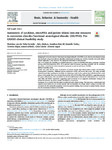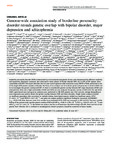Do the severity of Intellectual Disability and /or the presence of neurodevelopmental disorders influence the onset of dementia in people with Down syndrome?
| dc.contributor.author | Anderson, M | |
| dc.contributor.author | Oak, K | |
| dc.contributor.author | Goodey, R | |
| dc.contributor.author | Dodd, Karen | |
| dc.contributor.author | Shankar, Rohit | |
| dc.date.accessioned | 2021-05-22T19:13:44Z | |
| dc.date.available | 2021-05-22T19:13:44Z | |
| dc.date.issued | 2020-10-01 | |
| dc.identifier.issn | 1931-5864 | |
| dc.identifier.issn | 1931-5872 | |
| dc.identifier.uri | http://hdl.handle.net/10026.1/17177 | |
| dc.description.abstract |
Introduction: Having a diagnosis of Down syndrome (DS) is associated with intellectual disability (ID), pervasive developmental disorders and Alzheimer’s dementia (AD). The association between these conditions has not been well evaluated. This paper looks to examine the current evidence pertaining to the relationship between dementia in people with DS and severity of ID and the presence of pervasive developmental disorders. Methods: A scoping review using PRISMA guidance was undertaken. Medline, Cochrane database, NHS evidence, Trial registers and Open Grey were searched in December 2018 and an updated search was completed in July 2020. Three search strategies were used to retrieve articles relating to DS, dementia, pervasive developmental disorders (including autism, autism spectrum disorder (ASD) and attention-deficit hyperactivity disorder (ADHD)) and severity of ID. Studies were included if they met the pre-defined inclusion criteria of investigating an association between autism/ASD, ADHD, or severity of ID and the development of dementia in people with DS. Studies were excluded if they did not include primary data, if the population included non-Down causes of ID, or if no specific outcome measure related to comorbid autism/ASD, ADHD, or severity of ID and dementia in people with a diagnosis of DS were reported. There were no exclusions related to study design. Papers were assessed for quality using the Mixed Methods Appraisal Tool (MMAT). Results: The search identified 15 papers, publishing results from 12 studies, relating to severity of ID, DS and dementia. No papers were identified relating to pervasive developmental disorders, DS and dementia. There is limited evidence on how severity of ID impacts on the presentation, diagnosis, management or prognosis of dementia in people with DS. However, no evidence was found on comorbid pervasive developmental disorders, DS and dementia. Conclusion: This paper has identified multiple areas for future research. There is an urgent need for longitudinal studies into the presentation, development and progression of dementia in people with DS ensuring the severity of ID and comorbid pervasive developmental conditions are captured regularly to understand their influence on the dementia etiology and outcome. | |
| dc.format.extent | 322-342 | |
| dc.language | en | |
| dc.language.iso | en | |
| dc.publisher | Informa UK Limited | |
| dc.rights | Attribution-NonCommercial-NoDerivatives 4.0 International | |
| dc.rights | Attribution-NonCommercial-NoDerivatives 4.0 International | |
| dc.rights | Attribution-NonCommercial-NoDerivatives 4.0 International | |
| dc.rights | Attribution-NonCommercial-NoDerivatives 4.0 International | |
| dc.rights.uri | http://creativecommons.org/licenses/by-nc-nd/4.0/ | |
| dc.rights.uri | http://creativecommons.org/licenses/by-nc-nd/4.0/ | |
| dc.rights.uri | http://creativecommons.org/licenses/by-nc-nd/4.0/ | |
| dc.rights.uri | http://creativecommons.org/licenses/by-nc-nd/4.0/ | |
| dc.subject | Down syndrome | |
| dc.subject | intellectual disability | |
| dc.subject | dementia | |
| dc.subject | neurodevelopmental disorder | |
| dc.subject | pervasive developmental disorder | |
| dc.subject | autism spectrum disorder | |
| dc.subject | attention-deficit hyperactivity disorder | |
| dc.title | Do the severity of Intellectual Disability and /or the presence of neurodevelopmental disorders influence the onset of dementia in people with Down syndrome? | |
| dc.type | journal-article | |
| dc.type | Review | |
| dc.type | Journal | |
| plymouth.author-url | https://www.webofscience.com/api/gateway?GWVersion=2&SrcApp=PARTNER_APP&SrcAuth=LinksAMR&KeyUT=WOS:000583845100001&DestLinkType=FullRecord&DestApp=ALL_WOS&UsrCustomerID=11bb513d99f797142bcfeffcc58ea008 | |
| plymouth.issue | 4 | |
| plymouth.volume | 13 | |
| plymouth.publication-status | Published | |
| plymouth.journal | Journal of Mental Health Research in Intellectual Disabilities | |
| dc.identifier.doi | 10.1080/19315864.2020.1822964 | |
| plymouth.organisational-group | /Plymouth | |
| plymouth.organisational-group | /Plymouth/Faculty of Health | |
| plymouth.organisational-group | /Plymouth/Users by role | |
| dc.identifier.eissn | 1931-5872 | |
| dc.rights.embargoperiod | Not known | |
| rioxxterms.versionofrecord | 10.1080/19315864.2020.1822964 | |
| rioxxterms.licenseref.uri | http://creativecommons.org/licenses/by-nc-nd/4.0/ | |
| rioxxterms.type | Journal Article/Review |





